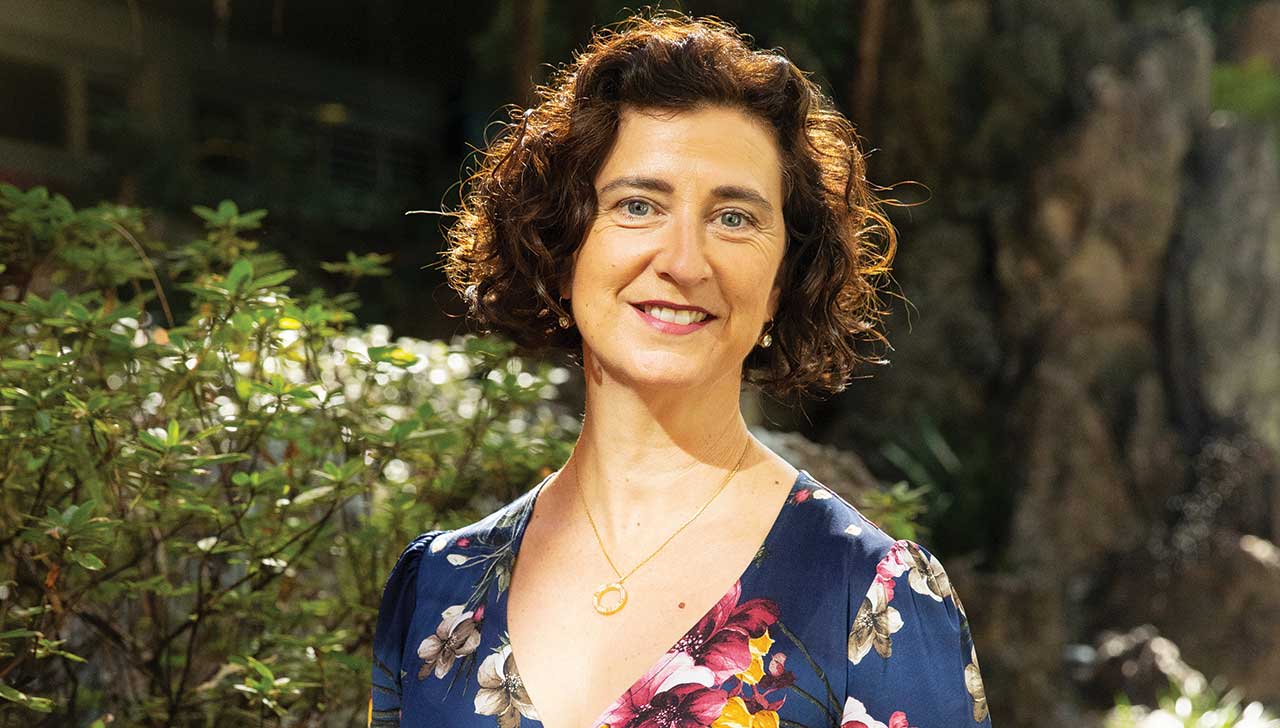The various dementias are a huge cause of death in Australia. Despite some light on the horizon, there are still no effective treatments. AP explores the latest in dementia research.
Dementia is the second leading cause of death in Australia.1 The number of people living with the disease is expected to increase substantially as the population ages, potentially straining health systems.2
Despite accelerated research, including trials of more advanced compounds and recent Victorian Government grants supporting mRNA-based projects, effective treatments remain elusive.3
According to Dementia Australia’s Executive Director of Services, Advocacy and Research, Dr Kaele Stokes (she/her), an estimated 433,000 Australians are currently living with dementia, including 29,000 people living with younger-onset dementia (when symptoms emerge before age 65).1
While there have been important advances in pharmaceutical research in the dementia field in recent years, Dr Stokes says, new medicines to date have limited application, availability and efficacy, and they do not stop the progression of dementia.
It is important to ensure health systems support everyone living with dementia now, she adds, noting that the new medicines may not work for many people with the condition, particularly patients who have lived with dementia for some time.
‘We don’t have an approach here in Australia that focuses on the importance of brain health across the life course,’ she says.
‘While we’re good at picking up other diseases, such as cardiovascular disease or diabetes, and putting steps in place to ensure the risks of severity in those conditions are minimised, we don’t really have conversations about brain health in a healthcare setting.’
Diagnosing dementia for younger and older people
Dr Stokes says while diagnostic tools are improving, diagnosing dementia is still a complex process.
Dementia is still seen as an older person’s disease, she adds, and it can be difficult for a person in their 40s or 50s to receive a dementia diagnosis.
According to a 2025 study in Translational Psychiatry, young-onset dementia in people aged under 65 years globally increased substantially in prevalence and incidence between 1990 and 2021 compared with overall people with dementia – and with a higher burden on women.4 The three highest risk factors were smoking, high body mass index and high fasting plasma glucose levels, while population growth was the largest contributor to the significant increase.4
‘There’s still a real fear and stigma around wanting to talk about brain health or talking to a healthcare professional about concerns around changes in cognition,’ Dr Stokes says.
‘But actually there are lots of reasons why it’s important to do that. A mix of pharmacological and non-pharmacological interventions can make a difference to quality of life and reduce the stress that somebody might be experiencing.’
It is important for people to focus on modifiable risk factors, potentially reducing the risk of developing dementia by about 45% by avoiding smoking or drinking too much and by maintaining a healthy diet, exercising regulary, and ensuring hearing and vision problems are identified and dealt with, Dr Stokes says.
 For those at later stages of their lives, it’s important to avoid social isolation and to keep the brain active, she adds.
For those at later stages of their lives, it’s important to avoid social isolation and to keep the brain active, she adds.
‘Learning new things can be really important – stretching the brain, firing up the neurons, to keep your brain active.’
Pharmacological advances
Healthcare professionals have high hopes for the potential benefits of newly available monoclonal antibody treatments for Alzheimer’s disease.5
University of Melbourne and Florey Institute Professor of Dementia Research Colin Masters, widely recognised as a world expert in the field of neurodegenerative diseases, estimates there are about 100 compounds in the pharmaceutical pipeline presently that are progressing through the trial stages.
‘Better forms, more effective forms, are coming within the next couple of years,’ he declares. ‘We’ve got to learn how to use them and manage all the adverse effects as well.’ He is optimistic about the future of dementia treatments – potentially including a routine vaccination.
‘The writing is on the wall,’ he says. ‘If the passive immunotherapies work, then everyone will be working on an active vaccination program. In other words, at age 50 or whatever, you just run up to your primary care physician, they do a blood test, you’re on the pathway – you get a shot of peptide in your arm.’
The most promising drug now on the horizon is trontinemab, Prof Masters says. It’s a reinvented form of the monoclonal antibody gantenerumab – a drug that didn’t make it to market because of a lack of efficacy. Even so, he adds, gantenerumab has been found effective for certain conditions. ‘We’ve been trialling it for nearly 10 years now,’ Prof Masters says, ‘and we published in Lancet Neurology9 [in June 2025] that in early-onset familial types of Alzheimer’s disease, gantenerumab in high doses was effective in pre-clinical disease in young individuals who are at 100% risk of developing Alzheimer’s disease.’ Trontinemab, he adds, is the natural successor to gantenerumab.
In April, Roche announced the results of a phase II trial of trontinemab delivered via the “Brainshuttle” system, which found ‘rapid and deep, dose-dependent reduction of amyloid plaques in the brain’.10 At the same time, Roche announced it would begin a phase III trial of the drug later this year.10
‘It’s the next generation; it’s a major advance,’ Prof Masters says, explaining that the bispecific molecule of trontinemab is designed to go straight across the blood-brain barrier, so doses of the drug can be far smaller.
‘It’s the first antibody designed to do this, and a lot of companies are copying it right now, because it works so well.’
According to data released from the Roche trials, trontinemab causes far fewer and less severe adverse effects than gantenerumab, he points out.
Other promising Alzheimer’s disease treatments include the monoclonal antibody donanemab. It is marketed as Kisunla by Eli Lilly, and in May 2025 it was approved by the Therapeutic Goods Administration.11
Lecanemab, marketed as Leqembi, has not yet been approved in Australia, but Prof Masters says full results of a pre-clinical trial are expected by the end of 2027 and he and his colleagues expect a positive result.
All these monoclonal antibody drugs are most effective in the early stages of Alzheimer’s disease, so early diagnosis is critical.12 In July this year, the Victorian Government also announced more than $537,000 in grants to two Florey researchers for two Alzheimer’s research projects.
These are aimed at treating and preventing the disease with mRNA technology, which was developed during the pandemic for COVID-19 vaccines.13
Pharmacist dementia support in the community
PSA’s Dementia Support Pharmacist Project in South Australia is an innovative project and model of practice aimed at keeping people with dementia at home and in the community for longer.14
Two pharmacists are employed on the project. They job-share to support clients with dementia medication management needs, understanding and choices, says South Australia and Northern Territory PSA Manager Helen Stone FPS (she/her).
The pharmacists act as patient advocates, provide flexible care for patients with complex comorbidities, and work with other members of the care team, including GPs, community pharmacists, nursing and care workers and families, she adds. Initial appointments are held in the patient’s home, preferably with follow-ups either personally, by telephone or collaboration application such as MS Teams. A report prepared by the pharmacist is shared with the patient and, with consent, to treating medical and care teams, which may recommend an action plan to change or deprescribe medicines. Education about medicine use in dementia is also provided to health professionals and community groups across regional areas of the state.
‘This is a much-needed service; it is accessible, but there are a lot more people we can’t yet support,’ Ms Stone says. PSA has demonstrated that pharmacists working directly with patients and liaising with the care team can provide valuable support for patients with complex conditions and multimorbidities.
The project began in May 2024 and has been extended to June 2026. Ms Stone recently submitted a proposal to SA Health to expand the program and include a further five FTE pharmacists to cover metropolitan Adelaide.
Dementia care pharmacists can help with complex deprescribing of medicines and tapering of antidepressants where needed. They can provide professional advice to family members caring for patients with dementia that can empower carers as advocates in cases, for instance, of inadequate pain management.
 Medicine administration frustrations can be avoided when dose time changes can be suggested.
Medicine administration frustrations can be avoided when dose time changes can be suggested.
Project pharmacist Dee-Anne Hull MPS (she/her) says pharmacist dementia support work helps in areas where it is needed most. ‘It has shown us where gaps in health care are in rural and remote areas of our state, but also within the pharmacy profession itself,’ she says. ‘A lot of pharmacists openly admit that dementia scares them, and they don’t really know where to start.
‘My advice is to make this an area of focus for CPD activities; check out the numerous PSA resources available, particularly those on palliative care and deprescribing, but also check out websites like Dementia Australia, Dementia Training Australia and the Wicking Dementia Centre,’ she adds.
‘Think about ways that you could support someone who is caring for a person living with dementia and the carer’s burden that may be associated with this, because that’s often where the support is needed the most.’
Positive response
Dementia Support Pharmacist Project pharmacist Nicola Sander MPS (she/her) says she has seen ‘overwhelming support and positive feedback’ for the project.
‘We have seen considerable benefit for people who are still living at home and are trying to manage their medicines.
Ms Sander sees this dementia support career pathway as ideal for an early career pharmacist and suggests that training in deprescribing and dementia-specific areas would be useful.
After a lengthy consultation with one client living at home, the client’s family and her doctor, Ms Sander recommended medicine management changes. The doctor was reluctant, so the client’s daughter found a doctor who was willing to be part of a multidisciplinary team, Ms Sander says, which included deprescribing strategies and pain support management.
After a recent visit to the geriatrician, the client’s daughter reported that her mother’s Mini‐Mental State Examination had improved from 12/30 to 19/30.
The daughter and the geriatrician attributed the client’s improvement to ‘better control of pain and overall improvement to her mood, as she has felt more supported and less depressed’ since.
Ms Stone, whose Churchill Fellowship palliative care research – To articulate a framework for the role of Palliative Care Pharmacist in community and aged care in Australia – Churchill Trust15 – informed the Dementia Support Pharmacist Project, says that education, training and curiosity help pharmacists to start understanding dementia care more fully.
She encourages everyone to complete a Program of Experience in the Palliative Approach (PEPA) placement.
‘A dementia diagnosis can be devastating for people and their families; medications can have a benefit but can also impair cognition, so support from a pharmacist can be very valuable.’
References
- Australian Institute of Health and Welfare. Dementia In Australia. 2024. At: www.aihw.gov.au/reports/dementia/dementia-in-aus/contents/population-health-impacts-of-dementia/deaths-due-to-dementia
- Dementia Australia. Dementia facts and figures. 2024. At: www.dementia.org.au/about-dementia/dementia-facts-and-figures
- Florey Institute for Neuroscience and Mental Health. Harnessing mRNA to prevent and slow Alzheimer’s disease. 2025. At: https://florey.edu.au/news/2025/07/harnessing-mrna-to-prevent-and-slow-alzheimers-disease/
- He Q, Wang W, Zhang Y, et al. Global burden of young-onset dementia, from 1990 to 2021: an age-period-cohort analysis from the global burden of disease study 2021. Transl Psychiatry 2025. Epub 2025, 17 February.
- Ramanan VK, Armstrong MJ, Choudhury P, et al. Antiamyloid monoclonal antibody therapy for Alzheimer disease. Neurology 2023;101(19)842–52. At: www.neurology.org/doi/10.1212/WNL.0000000000207757
- World Health Organization. Dementia. 2025. At: www.who.int/en/news-room/fact-sheets/detail/dementia
- Mayo Clinic. Alzheimer’s disease. 2025. At: www.mayoclinic.org/diseases-conditions/alzheimers-disease/symptoms-causes/syc-20350447
- Eyting M, Xie M, Michalik F, et al. A natural experiment on the effect of herpes zoster vaccination on dementia. Nature 2025. Epub 2025 2 April. At www.nature.com/articles/s41586-025-08800-x
- Safety and efficacy of long-term gantenerumab treatment in dominantly inherited Alzheimer’s disease: an open-label extension of the phase 2/3 multicentre, randomised, double-blind, placebo-controlled platform DIAN-TU trial. Bateman, Randall J et al. Lancet Neurology 2025; 24(4):316–30.
- Roche. Roche presents novel therapeutic and diagnostic advancements in Alzheimer’s at AP/PD 2025. 2025. At: www.roche.com/media/releases/med-cor-2025-04-03
- Burge K. Treatment to slow early Alzheimer’s gets TGA approval. newsGP 2025. At: www1.racgp.org.au/newsgp/clinical/treatment-to-slow-early-alzheimer-s-gets-tga-appro
- Promising results of new Alzheimer’s drug published – early diagnosis is key. 2023. At: www.dementia.org.au/media-centre/media-releases/promising-results-new-alzheimers-drug-published-early-diagnosis-key
- Victoria State Government. mRNA Victoria. Research. July 2025. At: https://djsir.vic.gov.au/mrna-victoria/research
- Sander N, Jull DA. Bridging the gap: how dementia support pharmacists are transforming care in rural South Australia. Issue 91. June 2, 2025. At: https://ruralhealth.org.au/partyline/bridging-the-gap-how-dementia-support-pharmacists-are-transforming-care-in-rural-south-australia/
- Stone H. To articulate a framework for the role of the palliative care pharmacist in community and aged care in Australia. Winston Churchill Trust 2025. At: www.churchilltrust.com.au/project/to-articulate-a-framework-for-the-role-of-palliative-care-pharmacist-in-community-and-aged-care-in-australia/




 Genevieve Adamo MPS (Image: Steve Christo Photography)[/caption]
Genevieve Adamo MPS (Image: Steve Christo Photography)[/caption]



 Deborah Williams at the Chemist Warehouse Australian Open pop-up pharmacy[/caption]
Deborah Williams at the Chemist Warehouse Australian Open pop-up pharmacy[/caption]








